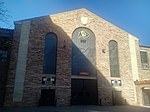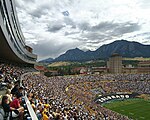Naropa University

Naropa University is a private university in Boulder, Colorado. Founded in 1974 by Tibetan Buddhist teacher Chögyam Trungpa, it is named for the 11th-century Indian Buddhist sage Naropa, an abbot of Nalanda. The university describes itself as Buddhist-inspired, ecumenical, and nonsectarian rather than Buddhist. Naropa promotes non-traditional activities like meditation to supplement traditional learning approaches. Naropa was accredited by the North Central Association of Colleges and Schools in 1988, making it the first Buddhist-inspired academic institution to receive United States regional accreditation. It remains one of only a handful of such schools. The university has hosted a number of Beat poets under the auspices of its Jack Kerouac School of Disembodied Poetics.
Excerpt from the Wikipedia article Naropa University (License: CC BY-SA 3.0, Authors, Images).Naropa University
Marine Street, Boulder
Geographical coordinates (GPS) Address External links Nearby Places Show on map
Geographical coordinates (GPS)
| Latitude | Longitude |
|---|---|
| N 40.014166666667 ° | E -105.26638888889 ° |
Address
Naropa University
Marine Street
80309 Boulder
Colorado, United States
Open on Google Maps






